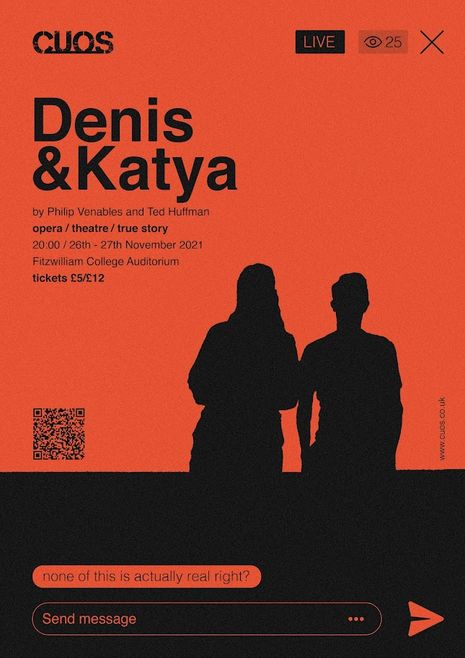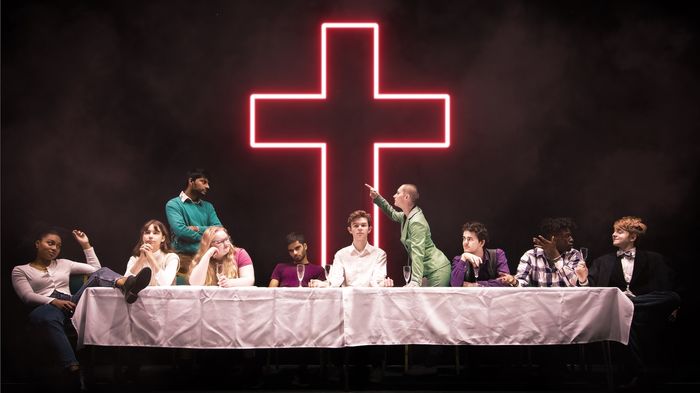Previewing: Denis and Katya
Director Oscar Simms and the team behind ‘Denis and Katya’ reflect on the nature and ethics of portraying true events on stage

At the beginning of their performance week, the production team and cast of this year’s CUOS Michaelmas production sat down to chat through the ethical questions involved in true stories on stage.
Denis & Katya is a true story opera about the deaths of two teenagers in Russia. It’s also absolutely not about that.
The opera follows the tradition of verbatim theatre, a form in which materials from real life events provide the basis for performance pieces. In this case, it is the true story of two 15-year-old Russian teenagers Denis Muravyov and Katya Vlasova that is a starting point.
Their story was reported worldwide in November 2016 after they ran away from home together and hid in a family-owned hunting cabin in Strugi Krasnye. After a few days, the police surrounded the house, the situation escalated and the pair died of gunshot wounds on November 16, 2016. Other circumstances of their death are unclear. They live-broadcast on social media frequently during the three days in the cabin, engaging with on-line viewers as they filmed while in the midst of a standoff with Russian Special Forces.
We started by discussing our first interactions with the story of Denis and Katya. Once we began working on the show, most of us also did our own research- reading original news reports on the case, watching videos, scrolling Reddit threads. Oscar Simms, Director, says ‘From the opera alone, you feel like you get to know Denis and Katya.... But then when you start to pin it down and think about it, obviously you have no idea’. In fact, Venables and Huffman’s piece never actually depicts the figures of Denis and Katya explicitly, only detailing the story through the second-hand accounts of people adjacent to them (friends, teachers, journalists). Although we hear lots about Denis and Katya, it’s never from the teenagers themselves. Oscar suggests this may be a strength- ‘it’s impossible to depict them accurately, fairly- so don’t try.’
“Adding music to text is always going to mean performance becomes slightly more stylised”
Yet the authors never make a claim to represent events accurately or realistically. By writing an opera rather than a play they deliberately move away from any attempt at naturalism, in fact. As Alistair Burton, Assistant Music Director, says, adding music to text is always going to mean performance becomes slightly more stylised. Perhaps this is wise. By its nature, a piece of theatre cannot be a straightforward or neutral act of representation. Even in the most strict verbatim pieces, directors make important decisions about what to include and exclude, about what to represent and what not to. Their choices shape audience response to the material in important ways and mean that any claim to neutrality or objectivity is difficult to justify.
Venables and Huffman do not deny their role in filtering the material. In fact, they embrace this as a formal aspect of the piece. Each scene in ‘Denis & Katya’ is interspersed with projected fragments of the author’s WhatsApp discussions about the process of creating the show. As much as it is about the two Russian teenagers, ‘Denis & Katya’ is also an opera about the process of storytelling, and about the biases that inevitably shape this process. As one of the opera’s characters, the Journalist says, ‘it’s total imagination-land’.
Our discussion turns next to the difficulties of presenting such tragic events on stage. Rosie Dunn, Co-Musical Director, cites the fact that a range of viewpoints are given as being a strength in this regard: ‘Trauma can reverberate through so many people… from these perspectives you get such a wide scope.’ Some of the show’s most poignant moments come from a friend of Denis reacting to and grieving his death- the line ‘Denis was my best friend’ stands out. Though the most obvious tragedy is the deaths of the teenagers, the tragedy of a young life rocked by grief feels just as deep.
“The urge to make the tragic something beautiful is common in opera”
Opera as a genre is not unused to dealing with difficult themes; in the operatic canon, suicides, murders and sexual assault abound, but often, they are depicted in a romanticised way. Actor Hannah Dienes-Williams suggests people wouldn’t want to watch performances about such horrible topics if they weren’t aestheticised in some way, turned into art as a means of distancing from their true horror. The urge to make the tragic something beautiful is common in opera, and even the real people interviewed by Huffman are not immune to this. At one point, the Journalist says ‘they’re super pretty - uh - and that always makes things much more tragic’, which, to quote Hannah, is ‘fucked up’.
Denis & Katya does its best to avoid this romanticisation. It does not shy away from the grittier, darker aspects of their lives and deaths, and projected text from Huffman and Venables encourages the audience to self reflect.
Eleanor Medcalf, Assistant Director, admits ‘I’m hesitant to say that it effectively deals with the issue of sensationalising and profiting off the traumatic experiences of others which happens in the media, because the opera blatantly does the same thing… I guess it is only through being culpable of the same offence that it can effectively challenge the media and theatre for doing the same thing.’
As Eleanor says, ‘its self awareness doesn’t necessarily redeem it from this offence’, yet the team also agree that it would feel wrong to stage the material without discussions such as those in the opera itself, and the one we’re having now.
 News / Cambridge and Manchester Universities meet for innovation partnership26 February 2026
News / Cambridge and Manchester Universities meet for innovation partnership26 February 2026 News / Private school teacher who lied about Cambridge degree barred from teaching27 February 2026
News / Private school teacher who lied about Cambridge degree barred from teaching27 February 2026 News / Cambridge academics sign open letter criticising research funding changes22 February 2026
News / Cambridge academics sign open letter criticising research funding changes22 February 2026 News / Judge Business School advisor resigns over Epstein and Andrew links18 February 2026
News / Judge Business School advisor resigns over Epstein and Andrew links18 February 2026 Theatre / The Memory of Water is dazzlingly well done27 February 2026
Theatre / The Memory of Water is dazzlingly well done27 February 2026









![How to Create an Attractive Freelancer Portfolio [5 Tips & Examples]](https://www.varsity.co.uk/images/dyn/ecms/320/180/2026/02/vitaly-gariev-ho2tNOWZYXM-unsplash-scaled.jpg)